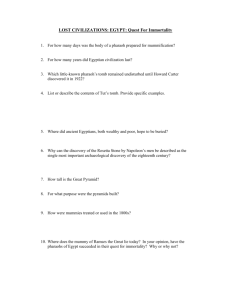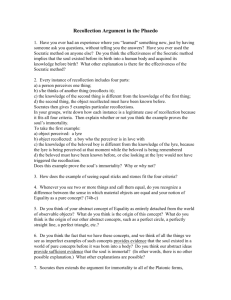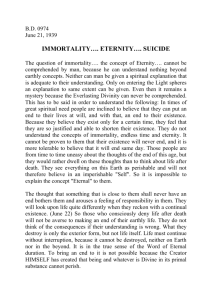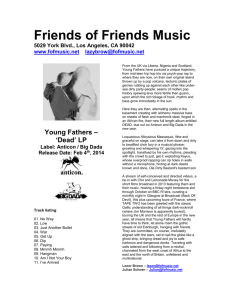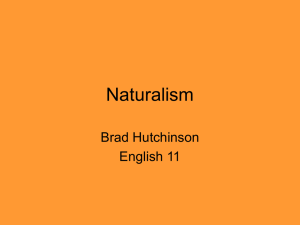Immortality in the Early Church
advertisement
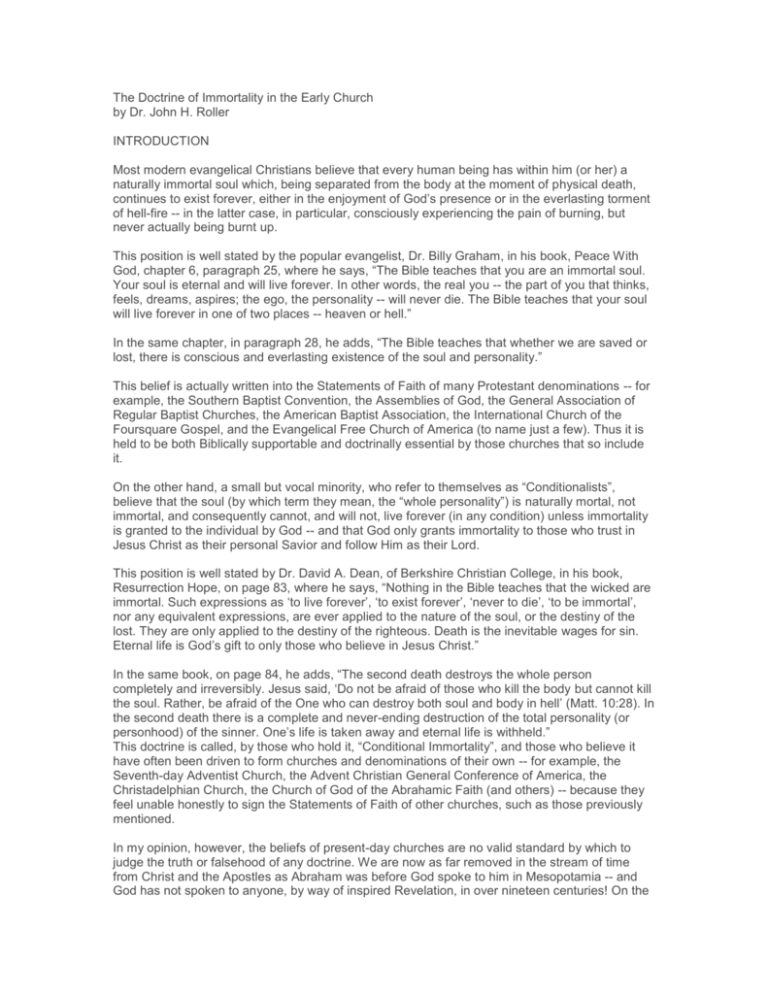
The Doctrine of Immortality in the Early Church by Dr. John H. Roller INTRODUCTION Most modern evangelical Christians believe that every human being has within him (or her) a naturally immortal soul which, being separated from the body at the moment of physical death, continues to exist forever, either in the enjoyment of God’s presence or in the everlasting torment of hell-fire -- in the latter case, in particular, consciously experiencing the pain of burning, but never actually being burnt up. This position is well stated by the popular evangelist, Dr. Billy Graham, in his book, Peace With God, chapter 6, paragraph 25, where he says, “The Bible teaches that you are an immortal soul. Your soul is eternal and will live forever. In other words, the real you -- the part of you that thinks, feels, dreams, aspires; the ego, the personality -- will never die. The Bible teaches that your soul will live forever in one of two places -- heaven or hell.” In the same chapter, in paragraph 28, he adds, “The Bible teaches that whether we are saved or lost, there is conscious and everlasting existence of the soul and personality.” This belief is actually written into the Statements of Faith of many Protestant denominations -- for example, the Southern Baptist Convention, the Assemblies of God, the General Association of Regular Baptist Churches, the American Baptist Association, the International Church of the Foursquare Gospel, and the Evangelical Free Church of America (to name just a few). Thus it is held to be both Biblically supportable and doctrinally essential by those churches that so include it. On the other hand, a small but vocal minority, who refer to themselves as “Conditionalists”, believe that the soul (by which term they mean, the “whole personality”) is naturally mortal, not immortal, and consequently cannot, and will not, live forever (in any condition) unless immortality is granted to the individual by God -- and that God only grants immortality to those who trust in Jesus Christ as their personal Savior and follow Him as their Lord. This position is well stated by Dr. David A. Dean, of Berkshire Christian College, in his book, Resurrection Hope, on page 83, where he says, “Nothing in the Bible teaches that the wicked are immortal. Such expressions as ‘to live forever’, ‘to exist forever’, ‘never to die’, ‘to be immortal’, nor any equivalent expressions, are ever applied to the nature of the soul, or the destiny of the lost. They are only applied to the destiny of the righteous. Death is the inevitable wages for sin. Eternal life is God’s gift to only those who believe in Jesus Christ.” In the same book, on page 84, he adds, “The second death destroys the whole person completely and irreversibly. Jesus said, ‘Do not be afraid of those who kill the body but cannot kill the soul. Rather, be afraid of the One who can destroy both soul and body in hell’ (Matt. 10:28). In the second death there is a complete and never-ending destruction of the total personality (or personhood) of the sinner. One’s life is taken away and eternal life is withheld.” This doctrine is called, by those who hold it, “Conditional Immortality”, and those who believe it have often been driven to form churches and denominations of their own -- for example, the Seventh-day Adventist Church, the Advent Christian General Conference of America, the Christadelphian Church, the Church of God of the Abrahamic Faith (and others) -- because they feel unable honestly to sign the Statements of Faith of other churches, such as those previously mentioned. In my opinion, however, the beliefs of present-day churches are no valid standard by which to judge the truth or falsehood of any doctrine. We are now as far removed in the stream of time from Christ and the Apostles as Abraham was before God spoke to him in Mesopotamia -- and God has not spoken to anyone, by way of inspired Revelation, in over nineteen centuries! On the question of human immortality, as on every other subject of spiritual interest, we should not ask, “What do modern churches teach?”, but rather, “What does the Bible say?” and “How did the early Christians interpret its statements?” With this principle in mind, then, I would like to discuss this question: What can we learn from the writings of the early Church Fathers as to the position(s) held in their times on the subject of human immortality? Specifically, we will want to see whether the Apostolic, Sub-Apostolic, and Ante-Nicene Fathers of the first, second and third centuries held a view similar to the popular modern view, or one more similar to the Conditionalist view. NATURAL IMMORTALITY Proponents of the view I am referring to as the doctrine of “Natural Immortality”, or “Naturalism”, usually hold either a dichotomist or trichotomist view of the nature of man. Let me define these two terms. Dichotomism is the view that a human being consists of two separable parts, the “material” and the “immaterial”. In this view, the “material part” consists of everything that can be observed and analyzed chemically: in other words, the “body”. The “immaterial part” consists of everything that cannot be so observed and analyzed: the “mind”, the “emotions”, the “personality”, and the “soul”, or “spirit” (most dichotomists use the latter two terms almost interchangeably). Trichotomism, on the other hand, is the view that a human being consists of three separable parts, the “body”, the “soul”, and the “spirit”. In this view, the “body” consists of everything that can be observed and analyzed chemically, and the “soul” and the “spirit” are distinguished, not only from the “body”, but also from each other. The “soul” is usually viewed as that “part” of man which is immaterial, but is also possessed by animals (the “mind”, the “emotions”, etc.), while the “spirit” is that “part” of man which is both immaterial and uniquely human (the “will”, the “personality”, the ability to make moral choices, the ability to have a relationship with God, etc.). Both dichotomists and trichotomists believe that at death, the “parts” are separated and experience different destinies. Dichotomists and trichotomists agree that the “material part”, or “body”, disintegrates unless chemically or miraculously preserved; dichotomists believe that the “immaterial part” survives, remains conscious, and goes directly to its eternal destiny, while trichotomists believe that the “soul” and the “spirit” are separated, not only from the “body”, but also from each other, and may experience separate, and different, destinies. For the purposes of this discussion, I will not attempt to distinguish between dichotomists and trichotomists, but will lump into one group all those who believe that a human being consists of separable parts, if they hold in common the idea that some “part” of man survives the death of the “body” and is destined before Creation to continue to exist forever. These people I will conveniently designate as “Naturalists”, meaning that they hold to the view I am referring to as the doctrine of “Natural Immortality”, or “Naturalism”. CONDITIONAL IMMORTALITY Proponents of the view I am referring to as the doctrine of “Conditional Immortality”, or “Conditionalism”, usually hold a monistic, or “unitary”, view of the nature of man. Here is another term to define. In this view, “body”, “soul”, “spirit”, and so on, are not separable “parts”, but merely different ways of describing the same individual person. The “body” is the person viewed from a physical standpoint; the “mind” is the person viewed from an intellectual standpoint; the “will” is the person viewed in his or her capacity to make moral choices; and so on. Adherents to this doctrine see the term “soul” as equivalent to the “total personality”, pointing to the many references in Scripture where the expression “my soul” is used to mean “I”; “ his soul”, “he”; etc. And, for many who hold this view, the “spirit” is not seen as an aspect of the human being at all, but as the “living force” which “energizes” the person and makes him (or her) “alive” (as opposed to “dead”). It should seem logical to you, as it does to me, that anyone holding such a view of the nature of man will not view death as any kind of “separation” of the human being into “parts” with differing destinies. This definition of man’s nature requires that every aspect of his total personality experience the same fate. Since the fate of at least one aspect -- the “body” -- is well known to be disintegration (and eventual nonexistence), it should be obvious that the fate of all the other aspects would be the same, and that there would be no hope for a person’s continued existence, in any form, after his (or her) death, unless God were to intervene with a miracle. That is, indeed, what most Conditionalists believe, based on their understanding of the nature of human beings. The idea of “Conditional Immortality” is then introduced as the solution to the problem thus created. According to this view, God will raise whole persons from a state of death to a state of immortality, providing that, in this life, the “condition” (faith in Christ as Lord and Savior) has been met. Those who have not believed in Christ will be punished with the “second”, or final, death: complete destruction of the entire person, or “soul”, with no hope of another opportunity for repentance and salvation. Though many Conditionalists dislike the word “annihilation”, it accurately describes what they believe will be the ultimate fate of those who do not repent of their sins -- in this life -- and receive God’s forgiveness. For the purposes of this discussion, I will conveniently designate as “Conditionalists” those writers who hold to the view I am referring to as the doctrine of “Conditional Immortality”, or “Conditionalism”. THE ANCIENT SOURCES As mentioned in the Introduction, our primary source of data on the understanding of human immortality that prevailed in the Early Church will be the writings of the Apostolic, Sub-Apostolic, and Ante-Nicene Fathers of the first, second, and third centuries A.D. These are defined as follows: 1) The Apostolic Fathers are those writers whose lifetimes overlapped with those of the Apostles, and who may therefore be supposed to have had personal knowledge of the Apostles’ teachings. 2) The Sub-Apostolic Fathers are those writers whose lifetimes overlapped with those of the Apostolic Fathers, and who may therefore be supposed to have had personal knowledge of the Apostolic Fathers’ understanding of the Apostles’ teachings. 3) The Ante-Nicene Fathers are all other Christian writers whose work was completed before the Council of Nicaea, which took place in A.D. 325. Since the Apostle John died in A.D. 102, I will classify as Apostolic Fathers only those writers born before that date. Of this group, those who wrote on the subject of immortality were: Clement of Rome (A.D. 30-97) Ignatius of Antioch (A.D. 35-108) Polycarp of Smyrna (A.D. 69-155) Papias of Hierapolis (A.D. 70-163) The writer(s) of the Didache (approximately A.D. 120) Aristides of Athens (approximately A.D. 125) Quadratus of Athens (approximately A.D. 126) Mathetes (approximately A.D. 130) Barnabas of Alexandria (approximately A.D. 135) Hermas of Rome (A.D. 100-?) Based on these dates, I will use A.D. 190 as a convenient cut-off date to distinguish between the Sub-Apostolic Fathers and the Ante-Nicene Fathers. The Sub-Apostolic Fathers, then, who wrote on the subject of immortality, were: Justin of Samaria (A.D. 106-165) Tatian of Assyria (A.D. 110-172) Theophilus of Antioch (A.D. 115-181) Melito of Sardis (A.D. ?-190) Athenagoras of Athens (A.D. 127-190) Polycrates of Ephesus (A.D. 125-196) Irenaeus of Lyons (A.D. 130-202) And, by these definitions, the Ante-Nicene Fathers who wrote on the subject of immortality before the end of the third century A.D. were: Clement of Alexandria (A.D. 153-213?) Tertullian of Carthage (A.D. 145-220) Hippolytus of Portus Romanus (A.D. 170-236) The writer(s) of the Pseudo-Clementines (approximately A.D. 220) Minucius Felix of Africa (A.D. 185-250) Origen of Alexandria (A.D. 185-254) Commodianus of Africa (A.D. 200-275) Cyprian of Carthage (A.D. 200-258) Novatian of Rome (A.D. 210-280) Gregory Thaumaturgus of Neo-Caesarea (A.D. 213-270) Arnobius of Sicca (A.D. 250-327) This is not, of course, a complete list of all the Christian writers of the first three centuries A.D.; however, it is a complete list of all those writers of that period in whose works I was able to find any reference to the subject of human immortality. In any case, no major Christian writers of the first three centuries have been intentionally omitted from consideration in the compiling of this list. It cannot be said that I have begged the question by prejudiced selection of source materials. THE ANCIENT SOURCES CONSULTED The Biblical texts relating to the question of human immortality are far too numerous to list and evaluate in a discussion of this length; nor is it the purpose of this discussion to “prove” the correctness or incorrectness of the doctrines of Naturalism and Conditionalism by the traditional method of Scriptural proof-texting. It is, rather, the stated purpose of this discussion to determine which of the two positions was more prominent in the Christian Church during its first three centuries of existence. For this reason I have purposely avoided any attempts to analyze the writings of the Apostles themselves, or any other Scriptures, and restricted my attention to an examination of the teachings of the Apostolic, Sub-Apostolic, and Ante-Nicene Fathers. My procedure was as follows: In approximately chronological order, I studied the life of each writer, read his major works, then analyzed some quotations from his writings, with a view to determining if he should be classified as a Naturalist or a Conditionalist. It should be obvious that this was not a verse-by-verse study of all of the Patristic writings! But it represents the conclusions drawn from careful, in-depth study of each Father and his works, and I have tried my best to be unbiased in my attempts at classification. It was my belief that the point to be made in the conclusion could best be established by this method. THE QUESTION ANSWERED Our topic for discussion was defined as follows: “What can we learn from the writings of the early Church Fathers as to the position(s) held in their times on the subject of human immortality? Specifically, we will want to see whether the Apostolic, Sub-Apostolic, and Ante-Nicene Fathers of the first, second and third centuries held a view similar to the popular modern view, or one more similar to the Conditionalist view.” After defining the two views, and labeling them, for convenience, as “Naturalism” and “Conditionalism”, respectively, I reviewed the lives and works of ten Apostolic, seven SubApostolic, and eleven Ante-Nicene Fathers, whose writings span the period from A.D. 95 to sometime between A.D. 303 and 310. I did not study every Christian writer of the first three centuries, but I studied every Christian writer of the first three centuries in whose works I was able to find any references to the subject of human immortality. I classified each of the twenty-eight writers as either Conditionalist or Naturalist. Now the time has come to ask: What did I learn from this exercise? It seems to me that the first, and perhaps most important, thing I learned is that in the early Church, just as in the present-day Church, there were true, sincere Christians of both of the two doctrinal persuasions we have been studying. I also saw that there was frequently an energetic, at times even vituperative, “debate” going on between the representatives of the two positions. Nevertheless, it is important to note that all of this was taking place within the broader context of the universal Christian fellowship which was generally known at the time as the “Catholic” Church. This was not primarily an argument between Christians and non-Christians, nor was it a “fight” between orthodox Christians and unorthodox cultists. It was, in fact, a doctrinal discussion between individuals, and among groups, all of whom were members of the same worldwide Body of Christ, the Christian Church. The second, and next most important, thing I learned is that, during the period under study, Conditionalism, and not (as it is today) Naturalism, was the more prevalent view of the writing Fathers of the Church. This fact can be demonstrated by a simple enumeration, as follows: Conditionalists: 14 definite, 4 probable -- total 18 Naturalists: 8 definite, 2 probable -- total 10 So Conditionalism was favored over Naturalism by almost a 2 to 1 majority of the 28 Fathers I was able to classify. Another question worth asking is: Was this a regional conflict? Were the Fathers in one geographical area more inclined to Conditionalism, and the Fathers in another more inclined to Naturalism? The following chart will illustrate the surprising answer to this question: Region Conditionalists Naturalists Asia 8 or 9 1 Europe 6 2 Africa 2 or 3 6 (Unknown) 1 1 When you come to the next paragraph, you will see the reason why there seems to have been such a predominance of Conditionalism in Asia, the continent on which Christianity originated. The “surprise” is to see the contrast between the predominance of Conditionalism in Europe, the continent which later became the “world headquarters” of Christianity, and the predominance of Naturalism in Africa, the continent on which Christianity later became virtually extinct. One would have thought it would have been the other way around! What the chart really shows is that both Conditionalists and Naturalists could be found in all three areas of the world that were influenced by Christianity in the early centuries. I do not believe it shows that geography, or regionalism, really played a very important role in the debate at that time. It seems to me that a much more significant role was played by the passage of time. The following chart is constructed so as to illustrate the “progress” of the two doctrines over the period of time covered by the study. It lists each Church Father under the appropriate heading in chronological order from the time of the Apostles (at the top of the page) toward the time of the Council of Nicaea (at the bottom). Conditionalists Naturalists Clement of Rome Ignatius of Antioch Polycarp of Smyrna Papias of Hierapolis Writer(s) of Didache Aristides of Athens Quadratus of Athens Mathetes Barnabas of Alexandria Hermas of Rome Justin of Samaria Tatian of Assyria Theophilus of Antioch Melito of Sardis Athenagoras of Athens Polycrates of Ephesus Irenaeus of Lyons Clement of Alexandria Tertullian of Carthage Hippolytus of Portus Romanus Writer(s) of Pseudo-Clementines Minucius Felix of Africa Origen of Alexandria Commodianus of Africa Cyprian of Carthage Novatian of Rome Gregory Thaumaturgus of Neo-Caesarea Arnobius of Sicca Looked at this way, the “score” becomes: Prior to the time of Clement of Alexandria -- 16 Conditionalists, 1 Naturalist From the time of Clement of Alexandria on -- 2 Conditionalists, 9 Naturalists It is clear from this chart that Conditionalism was the original doctrine of the Early Church (A.D. 95-177), and that Naturalism was first introduced by Athenagoras of Athens, and popularized by Tertullian of Carthage, after whose time it rapidly became the predominant view, though there continued to be an outspoken minority of Conditionalists. Now it becomes clearer why Conditionalism was so much stronger in Asia during the first three centuries than it was in Europe and Africa. Asia was the continent on which Christianity originated. The churches of Asia held more tenaciously to the original doctrine (Conditionalism) while the churches in Europe and Africa were progressively coming under the influence of the more recent doctrine (Naturalism). Outside the defined scope of this book, but certainly within the pale of relevance to its topic, is the question of how the debate between proponents of the two doctrines proceeded after the Council of Nicaea (A.D. 325). Briefly, the answer to this question is that the debate continued, with a higher and higher percentage of the Post-Nicene writers embracing Naturalism as the centuries passed. At no point was unanimity reached. Finally, in A.D. 1513, the Fifth Lateran Council of the Roman Catholic Church officially condemned Conditionalism as heresy. Even then, however, the debate did not end. Only four years later, Martin Luther broke with Roman Catholicism and began the movement known today as Protestantism. He, and many other early Protestant leaders, such as John Wycliffe, William Tyndale, John Milton, and John Darby, revived the ancient belief in Conditional Immortality. Other reformers were Naturalists. So, while the debate was ended in the Roman Catholic Church, by officialdecree, it quickly sprang up again in the Protestant churches, and continues (there) to this day. As I mentioned in the Introduction, some denominations have taken an official “stand” for one position or the other. Many other denominations have kept their doors open to Christians of either persuasion. The “debate” continues. CONCLUDING REMARKS We have seen that there are two radically different opinions on the question of human immortality: we have come to know them as Naturalism and Conditionalism. We have also seen that throughout most of Christian history a “debate” has raged between proponents of the two positions. Furthermore, we have discovered that almost all of the Church Fathers who wrote before A.D. 200 were Conditionalists, and that most of those who wrote between then and A.D. 310 were Naturalists. We have concluded that Conditional Immortality was the original, and predominant, doctrine of the early Church. At this point I think it would be wise to reiterate that I have not sought to “prove” the correctness or incorrectness of either doctrine. I have only sought to determine which view was more prevalent in the early Church. That is why I have quoted extensively from the writings of the early Church Fathers and have not quoted frequently from the Holy Scriptures. I am by no means trying to imply that the Bible has nothing to say on this subject: on the contrary, it has so much to say that a much, much longer book would be required to cover it all. Nor am I implying that what the Bible says is not important. Rather, it is my belief that whatever the Bible teaches on this subject is of absolute and decisive importance. But it was the stated purpose of this paper to analyze the views of the early Church, and the Bible’s comments are therefore outside the defined scope of the book. Is immortality natural, or conditional? If there were a simple, clear, Biblical answer to this question, there would not have been debate over it for over eighteen centuries of Christian history. As I have already quoted Arnobius of Sicca as saying, “On the one hand, arguments present themselves to the one party by which it is found that the soul is capable of suffering, and perishable; and, on the other hand, are not lacking to their opponents, by which it is shown that the soul is divine and immortal.” (Disputations 31:3) That being the case, I think it best for modern churches to keep an open door to Christians of either persuasion, rather than insisting that members be required to affirm either one doctrine or the other. Truth is not determined by majority vote, nor is it determined by ecclesiastical decree. Each Christian should have the freedom to make up his or her own mind as to what to believe on this question, rather than having a prepackaged answer imposed on the conscienceby a denominational Statement of Faith. In the final analysis, only God knows the true answer, and only when we see Him face to face will we know it as fully as He does.
